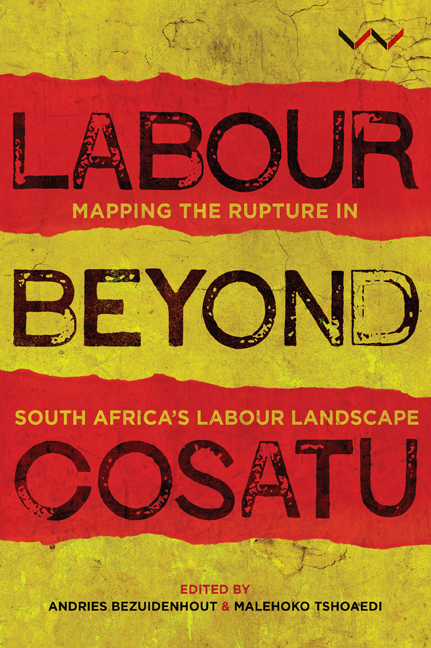Book contents
- Frontmatter
- Contents
- Figures and Tables
- Abbreviations and Acronyms
- Preface
- Chapter 1 Democracy and the Rupture in South Africa's Labour Landscape
- Chapter 2 Research in a Highly Charged Environment: Taking Democracy Seriously, 2014
- Chapter 3 The Social Character of Labour Politics
- Chapter 4 Is Cosatu Still a Working-Class Movement?
- Chapter 5 Labour Aristocracy or Marginal Labour Elite? Cosatu members' income, other sources of livelihood and household support
- Chapter 6 The Politics of Alliance and the 2014 Elections
- Chapter 7 Cosatu, Service Delivery, Civil Society and the Politics of Community
- Chapter 8 The Politics of Male Power and Privilege in Trade Unions: Understanding sexual harassment in Cosatu
- Chapter 9 Internal Democracy in Cosatu: Achievements and challenges
- Chapter 10 Public Sector Unions in Cosatu
- Chapter 11 Are Cosatu's Public Sector Unions Too Powerful?
- Chapter 12 Labour Beyond Cosatu, Other Federations and Independent Unions
- Contributors
- Index
Chapter 11 - Are Cosatu's Public Sector Unions Too Powerful?
Published online by Cambridge University Press: 21 March 2018
- Frontmatter
- Contents
- Figures and Tables
- Abbreviations and Acronyms
- Preface
- Chapter 1 Democracy and the Rupture in South Africa's Labour Landscape
- Chapter 2 Research in a Highly Charged Environment: Taking Democracy Seriously, 2014
- Chapter 3 The Social Character of Labour Politics
- Chapter 4 Is Cosatu Still a Working-Class Movement?
- Chapter 5 Labour Aristocracy or Marginal Labour Elite? Cosatu members' income, other sources of livelihood and household support
- Chapter 6 The Politics of Alliance and the 2014 Elections
- Chapter 7 Cosatu, Service Delivery, Civil Society and the Politics of Community
- Chapter 8 The Politics of Male Power and Privilege in Trade Unions: Understanding sexual harassment in Cosatu
- Chapter 9 Internal Democracy in Cosatu: Achievements and challenges
- Chapter 10 Public Sector Unions in Cosatu
- Chapter 11 Are Cosatu's Public Sector Unions Too Powerful?
- Chapter 12 Labour Beyond Cosatu, Other Federations and Independent Unions
- Contributors
- Index
Summary
INTRODUCTION
Cosatu's public sector unions have grown stronger and stronger since the federation was founded. At its launch in November 1985, the membership of public sector unions totalled only 24 486, constituting only 5 per cent of all the founding unions’ membership (Baskin 1991: 55). By 1991, public sector union membership still comprised only 7 per cent of total Cosatu membership, but by 2012 it had risen to a hefty 39 per cent. By then, some of the federation's largest unions were public sector unions, such as Nehawu with 260 738 members, Sadtu with 251 276, and Popcru with 149 339 (Cosatu 2012: 7).
Over the years, the Cosatu public sector unions had flexed their muscles for all citizens in South Africa to see and feel. For instance, in 2007 and 2010 they played leading roles in public sector strikes that were the largest strikes ever experienced in South Africa up to that time (in terms of working hours lost). This has given rise to the question of whether the Cosatu public sector unions have become too powerful insofar as they, along with other public sector unions, have used their bargaining power to acquire excessive earnings and too large a share of the state's expenditure for their members – these acquisitions then prevent the state from providing adequate services to the public. In addition, it can be asked whether the public sector unions have also been too powerful to concede that their members have to improve service delivery to the public as their earnings rise.
This chapter commences with an overview of public sector employment relations, focusing mainly on developments since the advent of democracy in 1994. The question whether public sector unions in general, and Cosatu's public sector unions in particular, have become too powerful, is finally addressed. The focus is on whether the substantial resources allocated by the state to remunerate public servants are commensurate with the improvement in service delivery. As a case study, it examines school education and the role of Sadtu, a Cosatu-affiliated union. It also looks at some of the internal political disputes within Sadtu and briefly explores Sadtu shop stewards’ support for the ANC and the SACP in comparison to that of shop stewards in other Cosatu unions.
- Type
- Chapter
- Information
- Labour Beyond CosatuMapping the Rupture in South Africa's Labour Landscape, pp. 191 - 216Publisher: Wits University PressPrint publication year: 2017



